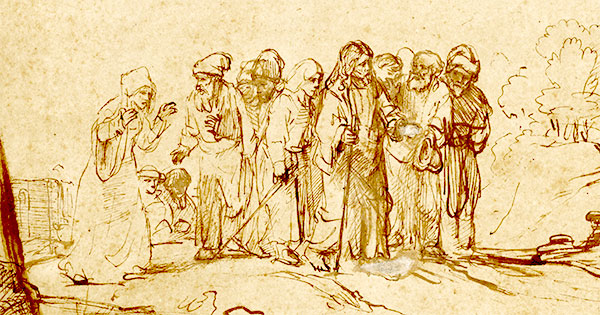
I suspect most of you are familiar with the story. Mark and Matthew both tell the story with some variation (Mark 7:24-30; Matt. 15:21-28). It’s really quite remarkable that two of the canonical Gospels include it. A Gentile woman (Syrophoenician in Mark, Canaanite in Matthew) “begged” (Mark) Jesus to heal her daughter (“cast the demon out”). Jesus said, “Let the children [referring to Israel] be fed first, for it is not fair to take the children’s food and throw it to the dogs” (Mark 7:27). Refusing to be deterred, she persisted with wit and faith, “Sir, even the dogs under the table eat the children’s crumbs.” In response, Jesus healed her daughter.
Evangelical commentators try to vindicate Jesus by either redefining love in more exclusive terms or by engaging in exegetical gymnastics with the text so that the text means something other than what it actually says. Even mainstream interpreters trained in historical-critical methodology generally resist questioning Jesus’s morality here. While they know that Jesus employs a racial slur to refer to Gentiles, they also know who pays their salaries. Even most mainstream Christians regard Jesus as flawless/sinless.
The straightforward meaning of the story suggests this woman taught Jesus a lesson in love and inclusion. Though it would seem somewhat difficult to deny the obvious, it is much easier when you are protecting your theology or your job. Being a pastor I understand this quite well. I’m fortunate that my church leadership gives me the freedom to state the obvious, namely: There were times Jesus fell short of the ideals of love and learned from his failures.
I find this story encouraging, because I know I fail at love almost daily. This story teaches me that there is hope for all of us that we can learn from our failures and become more empathetic, compassionate, caring, and inclusive.
I still imagine the Christ image as an image that reflects the fullness of love, but I also separate in my thinking the Christ image from the historical Jesus. The Christ image is the raised, glorified, archetypal image of a human being fully and completely radiating and expressing divine love. (In the Gospels the Christ image is often read back into the stories of the historical Jesus, making it virtually impossible to completely separate the theological from the historical. Thus, the Gospels are not historical reports; rather, they are proclamations of the meaning of Jesus for his followers.)
Frankly though, I’m not convinced that human beings will ever reach a state of perfection. I guess I’m more of a realist than an idealist, but in our current state of evolutionary development I find it very hard to imagine a flawless (sinless) human being. So when I speak of the Christ image as the quintessential image of the human fullness of divine love, I think in terms of completeness or maturity, not perfection or flawlessness. Humanity and perfection seem to me to be irreconcilable realities, Jesus being no exception.
The truly amazing thing is that from time to time there are human beings like Jesus. Not perfect, but clearly advanced in their moral, spiritual, and psychological development who embody the kind of courage, compassion, humility, integrity, and grace that we all can aspire to. And this gives me hope, even though evil and injustice are quite widespread.
If I had to believe in the Jesus who many evangelical Christians claim one has to believe in to be a Christian, I suspect I would retire from the ministry, buy a little place on a lake, and like Peter, go fishing.
 Chuck Queen is a Baptist minister and the author of Being a Progressive Christian (is not) for Dummies (nor for know-it-alls): An Evolution of Faith. Chuck blogs at A Fresh Perspective, and is also a contributor to the blog Faith Forward and Baptist News Global.
Chuck Queen is a Baptist minister and the author of Being a Progressive Christian (is not) for Dummies (nor for know-it-alls): An Evolution of Faith. Chuck blogs at A Fresh Perspective, and is also a contributor to the blog Faith Forward and Baptist News Global.












